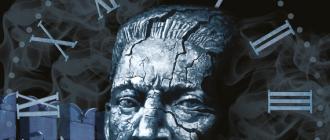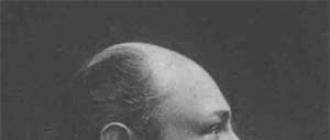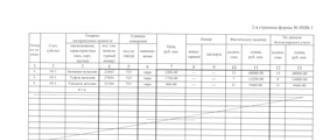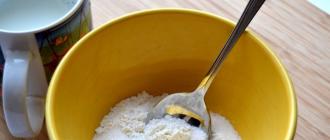(1904) in physiology and medicine, author of the doctrine of higher nervous activity. Born September 26 (14), 1849 in Ryazan. He was the eldest son in a large family of a parish priest, who considered it his duty to give his children a good education. In 1860, Pavlov was immediately admitted to the second class of the Ryazan Theological School. After graduating in 1864, he entered the theological seminary. Six years later, under the influence of the ideas of Russian revolutionary democrats, especially the works of Pisarev, and Sechenov’s monograph Brain reflexes left his studies at the seminary and entered the university. Due to the restrictions that existed at that time in choosing a faculty for seminarians, Pavlov first entered the Faculty of Law in 1870, then transferred to the natural sciences department of the Faculty of Physics and Mathematics.
At that time, among the university professors were outstanding scientists - D.I. Mendeleev, A.M. Butlerov, F.V. Ovsyannikov, I.F. Tsion. In the third year of the university, not without the influence of Tsion, Pavlov decided to specialize in the field physiology.
In 1875 Pavlov graduated from the university with a candidate's degree natural sciences. Zion invited him to become his assistant at the Department of Physiology of the Medical-Surgical Academy (since 1881 - Military Medical Academy, Military Medical Academy). He convinced the assistant to also get medical education). In the same year, Pavlov entered the Moscow Art Academy in his third year and received a doctor’s diploma in 1879.
After Tsion left the academy, Pavlov refused the position of assistant at the department of physiology, offered to him by the new head of the department, I.R. Tarkhanov. He decided to stay at the Moscow Art Academy only as a student. Later he became an assistant to Professor K.N. Ustimovich at the Department of Physiology of the Veterinary Department of the Medical-Surgical Academy, where he did a number of works on the physiology of blood circulation.
In 1878, the famous Russian clinician Botkin invited Pavlov to work in his clinic (he worked here until 1890, conducting research on the centrifugal nerves of the heart and working on his doctoral dissertation; from 1886 he was the head of the clinic).
At the end of the 70s, he met his future wife, S.V. Karchevskaya. The wedding took place in May 1881; in 1884 the couple left for Germany, where Pavlov trained in the laboratories of the leading physiologists of that time, R. Heidenhain and K. Ludwig.
In 1890 he was elected professor and head of the Department of Pharmacology at the Military Medical Academy, and in 1896 - head of the Department of Physiology, which he headed until 1924. Since 1890, Pavlov also headed the physiological laboratory at the Institute of Experimental Medicine.
From 1925 until the end of his life, Pavlov headed the Institute of Physiology of the Academy of Sciences.
In 1904, the first Russian scientist was awarded Nobel Prize for his work in the field of digestive physiology.
Pavlov was elected a member and honorary member of many foreign academies, universities, and societies. In 1935 at the 15th International Congress of Physiologists for many years scientific work was recognized as the doyen of physiologists in the world.
All scientific creativity of the scientist is united general principle, which at that time was called nervism - the idea of a leading role nervous system in the regulation of the activity of organs and systems of the body.
Scientific method.
Before Pavlov, research was carried out using the so-called. “acute experience”, the essence of which was that the organ of interest to the scientist was exposed using incisions on the body of an anesthetized or immobilized animal. The method was unsuitable for studying the normal course of life processes, as it disrupted the natural connection between the organs and systems of the body. Pavlov was the first physiologist to use the “chronic method,” in which an experiment is carried out on a practically healthy animal, which made it possible to study physiological processes in an undistorted form.
Research on the physiology of blood circulation.
One of the first scientific research Pavlov was devoted to studying the role of the nervous system in the regulation of blood circulation. The scientist found that transection of the vagus nerves innervating internal organs, leads to profound impairments in the body’s ability to regulate blood pressure levels. As a result, it was concluded that significant pressure fluctuations are detected by sensitive nerve endings in the vasculature, which send impulses signaling changes to the corresponding center of the brain. These impulses give rise to reflexes aimed at changing the work of the heart and the state of the vascular bed, and blood pressure quickly returns to the most favorable level.
Pavlov's doctoral dissertation was devoted to the study of the centrifugal nerves of the heart. The scientist proved the presence of “triple nerve control” on the heart: functional nerves that cause or interrupt the activity of the organ; vascular nerves that regulate delivery chemical material to the organ and trophic nerves, which determine the exact size of the final utilization of this material by each organ and thereby regulate the vitality of the tissue. The scientist assumed the same triple control in other organs.
Research on the physiology of digestion.
The method of “chronic experiment” allowed Pavlov to discover many laws of the functioning of the digestive glands and the digestive process in general. Before Pavlov, there were only some very vague and fragmentary ideas about this, and the physiology of digestion was one of the most backward sections of physiology.
Pavlov's first research in this area was devoted to studying the functioning of the salivary glands. The scientist established a relationship between the composition and amount of saliva secreted and the nature of the irritant, which allowed him to draw a conclusion about the specific excitability of different receptors in the oral cavity by each of the irritating agents.
Studies concerning the physiology of the stomach are Pavlov's most significant achievements in explaining the processes of digestion. The scientist proved the existence of nervous regulation of the activity of the gastric glands.
Thanks to the improvement of the operation to create an isolated ventricle, it was possible to distinguish two phases of gastric juice secretion: neuro-reflex and humoral-clinical. The result of the scientist’s research in the field of digestive physiology was his work entitled Lectures on the work of the main digestive glands, published in 1897. This work was translated into German, French and English languages and brought Pavlov worldwide fame.
Research on the physiology of higher nervous activity.
Pavlov moved on to the study of the physiology of higher nervous activity, trying to explain the phenomenon of mental salivation. The study of this phenomenon led him to the concept of a conditioned reflex. A conditioned reflex, unlike an unconditioned one, is not innate, but is acquired as a result of the accumulation of individual life experience and is an adaptive reaction of the body to living conditions. Pavlov called the process of formation of conditioned reflexes higher nervous activity and considered this concept equivalent to the term “mental activity.”
The scientist identified four types of higher nervous activity in humans, which are based on ideas about the relationship between the processes of excitation and inhibition. Thus, he laid a physiological foundation for the teaching of Hippocrates on temperaments.
Pavlov also developed the doctrine of signal systems. According to Pavlov, specific feature a person is the presence of, in addition to the first signaling system, common with animals (various sensory stimuli coming from the outside world), as well as the second signaling system - speech and writing.
Main goal scientific activity Pavlov was the study of the human psyche using objective experimental methods.
Pavlov formulated ideas about the analytical-synthetic activity of the brain and created the doctrine of analyzers, the localization of functions in the cerebral cortex and the systematic nature of the work of the cerebral hemispheres.
Publications: Pavlov I.P. Complete set of works, 2nd ed., vol. 1–6, M., 1951–1952; Selected works, M., 1951.
Artem Movsesyan
Ivan Petrovich Pavlov became known to us primarily as a physiologist, a famous scientist who created the science of higher nervous activity, which has enormous practical value for many sciences. This includes medicine, psychology, physiology, and pedagogy, and not just Pavlov’s dog, which reacts to a light bulb with an increased flow of saliva. For his services, the scientist was awarded the Nobel Prize and several were named after him. educational institutions, scientific institutes. Pavlov's books are still published in fairly large editions. For those who are not yet familiar with the achievements of the scientist and do not know who Ivan Petrovich Pavlov is, short biography will help correct this omission.
The future luminary was born in Ryazan, in the family of a clergyman, in 1849. Since Pavlov’s ancestors were “church members,” the boy was forced to go to a theological school and seminary. He later spoke warmly about this experience. But after accidentally reading Sechenov’s book on brain reflexes, Ivan Pavlov left his studies at the seminary and became a student at the Faculty of Physics and Mathematics in St. Petersburg.
Having completed the course with honors, he received academic degree candidate of natural sciences, and decided to continue his studies at the Medical-Surgical Academy, after which he received a doctor’s diploma.
Since 1879, Ivan Petrovich became the head of the laboratory at the Botkin clinic. It was there that he began his research into digestion, which lasted more than twenty years. Soon the young scientist defended his dissertation and was appointed private assistant professor at the Academy. But the offer from Heidenhain and Karl Ludwig, fairly well-known physiologists, to work in Leipzig seemed more interesting to him. Returning to Russia two years later, Pavlov continued his scientific activities.
By 1890, his name had become famous in scientific circles. Simultaneously with the leadership of physiological research at the Military Medical Academy, he also headed the department of physiology at the Institute of Experimental Medicine. The scientist's scientific work began with the study of the heart and circulatory system, but later the scientist devoted himself entirely to the study of the digestive system. Through many experiments, the white spots in the structure of the digestive tract began to disappear.
The scientist's main experimental subjects were dogs. Pavlov wanted to understand the mechanism of the pancreas and make the necessary analyzes of its juice. To do this, through trial and error, he brought out part of the dog's pancreas and created a so-called fistula. Through the hole, pancreatic juice came out and was suitable for research.
The next step was the study of gastric juice. The scientist was able to make a gastric fistula, which no one could do before. Now it was possible to study the secretion of gastric juice, its quantity and quality indicators, depending on the characteristics of the food.
Pavlov gave a report in Madrid and there outlined the main milestones of his teaching. A year later, having written a scientific work about his research, the scientist was awarded the Nobel Prize in 1904.
The next thing that attracted the scientist’s attention was the reaction of the body, including the digestive system, to external stimuli. This was the first step towards the study of conditioned and unconditioned connections - reflexes. This was a new word in physiology.
Many living organisms have a reflex system. Since a person has more historical experience, his reflexes are richer and more complex than those of the same dogs. Thanks to Pavlov's research, it became possible to trace the process of their formation and understand the basic principles of the cerebral cortex.
There is an opinion that in the post-revolutionary period, during the years of “devastation,” Pavlov found himself below the poverty line. But nevertheless, remaining a patriot of his country, he refused a very lucrative offer to move to Sweden for further scientific work with one hundred percent funding.
Some researchers believe that the scientist simply did not have the opportunity to travel abroad, and he submitted petitions for permission to emigrate. After some time, in 1920, the scientist finally received the long-promised institute from the state, where he continued his research.
His research was closely monitored by the top of the Soviet government, and thanks to this patronage, the scientist was able to fulfill his long-time dreams. Clinics equipped with new equipment were opened at his institutes, the staff was constantly expanding, and the funding was excellent. From that time on, regular publication of Pavlov's works also began.
But the scientist's health recent years left much to be desired. Having suffered from pneumonia several times, he looked unwell, was very tired and generally did not feel very well. And in 1936, after a cold that turned into another pneumonia, Pavlov died.
It may well be that today's medicines and would have coped with the disease, but then medicine was still at a low level of development. The death of the scientist was a major loss for the entire scientific world.
Pavlov's contribution to science cannot be overestimated. He brought physiology and psychology into one plane; his research into higher nervous activity gave impetus to the development of various sciences. The name of Ivan Petrovich Pavlov is now familiar to everyone educated person. I consider it possible to complete the presentation of the life and work of the scientist here, because a short biography of Pavlov I.P. sufficiently illuminated.
To recoil from a disastrous abyss, to withdraw a hand from a burning fire - Ivan Petrovich studied the nervous system of living beings and its reaction to various stimuli. Thanks to Pavlov, it became clearer how we survived and are surviving on this planet. For example, the scientist was the first to divide reflexes into unconditioned (instilled in us genetically, over many generations) and conditioned (which we ourselves acquire throughout our lives).
But most importantly, Pavlov proved that the basis of the work of the human psyche (including what was previously called the “soul” or “consciousness”) and all the complex relationships of a highly developed organism with the surrounding external environment are the physiological processes occurring in the cerebral cortex. Through the efforts of our hero, a new branch of science even came into being - “Physiology of Higher Nervous Activity.”
2. Found out about digestion
Ivan Petrovich found out what exactly is happening with the omelette that you swallowed at breakfast today. The scientist conducted hundreds of experiments to understand how food is chemically and mechanically processed in the body, how it is broken down and absorbed by the cells of the body (thanks to Pavlov, in particular, we can now treat large number diseases of the gastrointestinal tract).
Ivan Petrovich, for example, performed a unique operation that had never been given to anyone before: he made a fistula (an opening in the dog’s stomach), ensured that the animal remained healthy and it was possible to observe in natural conditions how and how much the body secretes gastric juice (in depending on the composition and quantity of food that enters the stomach). So Pavlov earned the Nobel Prize in Medicine in 1904 -
"for his investigation of the functions of the main digestive glands."
Ivan Petrovich Pavlov
Born on September 14, 1849 in Ryazan in the family of a priest. He himself graduated from the Ryazan Theological Seminary, but under the influence of the works of Ivan Sechenov, he decided to change his profession. He studied at St. Petersburg University and the Imperial Medical-Surgical Academy. In addition to the Nobel Prize, he received other important international awards: for example, the Cotenius Medal (1903) and the Copley Medal (1915). He was the director of the Physiological Institute of the USSR Academy of Sciences (now the I.P. Pavlov Institute of Physiology). He died on February 27, 1936 in Leningrad.
In 1860-1869 Pavlov studied at the Ryazan Theological School, then at the seminary.
Impressed by I.M. Sechenov’s book “Reflexes of the Brain,” he obtained permission from his father to take exams at St. Petersburg University and in 1870 he entered the natural sciences department of the Faculty of Physics and Mathematics.
In 1875, Pavlov was awarded a gold medal for his work “On the nerves that control the work in the pancreas.”
Having received a candidate of natural sciences degree, he entered the third year of the Medical-Surgical Academy and graduated with honors. In 1883 he defended his thesis “Centrifugal nerves of the heart” (one of the nerve branches going to the heart, now Pavlov’s strengthening nerve).
Having become a professor in 1888, Pavlov received his own laboratory. This allowed him to freely engage in research into the nervous regulation of gastric juice secretion. In 1891, Pavlov headed the physiological department at the new Institute of Experimental Medicine.
In 1895, he made a report on the activity of the salivary glands of the dog. “Lectures on the work of the main digestive glands” were soon translated into German, French and English and published in Europe. The work brought Pavlov great fame.
The scientist first introduced the concept of “conditioned reflex” in a report at the Congress of Naturalists and Doctors of Northern European Countries in Helsingfors (now Helsinki) in 1901. In 1904, Pavlov received the Nobel Prize for his work on digestion and blood circulation.
In 1907, Ivan Petrovich became an academician. He began to explore the role of various parts of the brain in conditioned reflex activity. In 1910, his work “Natural Science and the Brain” was published.
Pavlov experienced the revolutionary upheavals of 1917 very hard. In the ensuing devastation, his strength was spent on preserving the work of his whole life. In 1920, the physiologist sent a letter to the Council of People's Commissars “On freely leaving Russia due to the impossibility of conducting scientific work and rejection of the social experiment being carried out in the country.” Advice people's commissars adopted a resolution signed by V.I. Lenin - “in the shortest possible time create the most favorable conditions to support the scientific work of Academician Pavlov and his collaborators."
In 1923, after the publication of the famous work “Twenty years of experience in the objective study of higher nervous activity (behavior) of animals,” Pavlov undertook a long trip abroad. He visited scientific centers in England, France and the USA.
In 1925, the Physiological Laboratory at the Institute of Experimental Medicine of the USSR Academy of Sciences, which he founded in the village of Koltushi, was transformed into the Institute of Physiology. Pavlov remained its director until the end of his life.
In the winter of 1936, returning from Koltushi, the scientist fell ill with bronchial inflammation.
Died on February 27 in Leningrad.
(1904) in physiology and medicine, author of the doctrine of higher nervous activity. Born September 26 (14), 1849 in Ryazan. He was the eldest son in a large family of a parish priest, who considered it his duty to give his children a good education. In 1860, Pavlov was immediately admitted to the second class of the Ryazan Theological School. After graduating in 1864, he entered the theological seminary. Six years later, under the influence of the ideas of Russian revolutionary democrats, especially the works of Pisarev, and Sechenov’s monograph Brain reflexes left his studies at the seminary and entered the university. Due to the restrictions that existed at that time in choosing a faculty for seminarians, Pavlov first entered the Faculty of Law in 1870, then transferred to the natural sciences department of the Faculty of Physics and Mathematics.
At that time, among the university professors were outstanding scientists - D.I. Mendeleev, A.M. Butlerov, F.V. Ovsyannikov, I.F. Tsion. In the third year of the university, not without the influence of Tsion, Pavlov decided to specialize in the field physiology.
In 1875 Pavlov graduated from the university with a candidate's degree in natural sciences. Zion invited him to become his assistant at the Department of Physiology of the Medical-Surgical Academy (since 1881 - Military Medical Academy, Military Medical Academy). He convinced the assistant to also get a medical education). In the same year, Pavlov entered the Moscow Art Academy in his third year and received a doctor’s diploma in 1879.
After Tsion left the academy, Pavlov refused the position of assistant at the department of physiology, offered to him by the new head of the department, I.R. Tarkhanov. He decided to stay at the Moscow Art Academy only as a student. Later he became an assistant to Professor K.N. Ustimovich at the Department of Physiology of the Veterinary Department of the Medical-Surgical Academy, where he did a number of works on the physiology of blood circulation.
In 1878, the famous Russian clinician Botkin invited Pavlov to work in his clinic (he worked here until 1890, conducting research on the centrifugal nerves of the heart and working on his doctoral dissertation; from 1886 he was the head of the clinic).
At the end of the 70s, he met his future wife, S.V. Karchevskaya. The wedding took place in May 1881; in 1884 the couple left for Germany, where Pavlov trained in the laboratories of the leading physiologists of that time, R. Heidenhain and K. Ludwig.
In 1890 he was elected professor and head of the Department of Pharmacology at the Military Medical Academy, and in 1896 - head of the Department of Physiology, which he headed until 1924. Since 1890, Pavlov also headed the physiological laboratory at the Institute of Experimental Medicine.
From 1925 until the end of his life, Pavlov headed the Institute of Physiology of the Academy of Sciences.
In 1904, he was the first Russian scientist to be awarded the Nobel Prize for his work in the field of digestive physiology.
Pavlov was elected a member and honorary member of many foreign academies, universities, and societies. In 1935, at the 15th International Congress of Physiologists, he was recognized as the oldest physiologist in the world for his many years of scientific work.
All the scientific work of the scientist is united by a common principle, which at that time was called nervism - the idea of the leading role of the nervous system in regulating the activity of organs and systems of the body.
Scientific method.
Before Pavlov, research was carried out using the so-called. “acute experience”, the essence of which was that the organ of interest to the scientist was exposed using incisions on the body of an anesthetized or immobilized animal. The method was unsuitable for studying the normal course of life processes, since it disrupted the natural connection between the organs and systems of the body. Pavlov was the first physiologist to use the “chronic method,” in which an experiment is carried out on a practically healthy animal, which made it possible to study physiological processes in an undistorted form.
Research on the physiology of blood circulation.
One of Pavlov's first scientific studies was devoted to studying the role of the nervous system in the regulation of blood circulation. The scientist found that cutting the vagus nerves that innervate the internal organs leads to profound impairments in the body’s ability to regulate blood pressure. As a result, it was concluded that significant pressure fluctuations are detected by sensitive nerve endings in the vasculature, which send impulses signaling changes to the corresponding center of the brain. These impulses give rise to reflexes aimed at changing the functioning of the heart and the state of the vascular bed, and blood pressure quickly returns to the most favorable level.
Pavlov's doctoral dissertation was devoted to the study of the centrifugal nerves of the heart. The scientist proved the presence of “triple nerve control” on the heart: functional nerves that cause or interrupt the activity of the organ; vascular nerves, which regulate the delivery of chemical material to the organ, and trophic nerves, which determine the exact size of the final utilization of this material by each organ and thereby regulate the vitality of the tissue. The scientist assumed the same triple control in other organs.
Research on the physiology of digestion.
The method of “chronic experiment” allowed Pavlov to discover many laws of the functioning of the digestive glands and the digestive process in general. Before Pavlov, there were only some very vague and fragmentary ideas about this, and the physiology of digestion was one of the most backward sections of physiology.
Pavlov's first research in this area was devoted to studying the functioning of the salivary glands. The scientist established a relationship between the composition and amount of saliva secreted and the nature of the irritant, which allowed him to draw a conclusion about the specific excitability of different receptors in the oral cavity by each of the irritating agents.
Studies concerning the physiology of the stomach are Pavlov's most significant achievements in explaining the processes of digestion. The scientist proved the existence of nervous regulation of the activity of the gastric glands.
Thanks to the improvement of the operation to create an isolated ventricle, it was possible to distinguish two phases of gastric juice secretion: neuro-reflex and humoral-clinical. The result of the scientist’s research in the field of digestive physiology was his work entitled Lectures on the work of the main digestive glands, published in 1897. This work was translated into German, French and English within several years and brought Pavlov worldwide fame.
Research on the physiology of higher nervous activity.
Pavlov moved on to the study of the physiology of higher nervous activity, trying to explain the phenomenon of mental salivation. The study of this phenomenon led him to the concept of a conditioned reflex. A conditioned reflex, unlike an unconditioned one, is not innate, but is acquired as a result of the accumulation of individual life experience and is an adaptive reaction of the body to living conditions. Pavlov called the process of formation of conditioned reflexes higher nervous activity and considered this concept equivalent to the term “mental activity.”
The scientist identified four types of higher nervous activity in humans, which are based on ideas about the relationship between the processes of excitation and inhibition. Thus, he laid a physiological foundation for the teaching of Hippocrates on temperaments.
Pavlov also developed the doctrine of signal systems. According to Pavlov, a specific feature of a person is that, in addition to the first signal system, common with animals (various sensory stimuli coming from the outside world), he also has a second signal system - speech and writing.
The main goal of Pavlov's scientific activity was to study the human psyche using objective experimental methods.
Pavlov formulated ideas about the analytical-synthetic activity of the brain and created the doctrine of analyzers, the localization of functions in the cerebral cortex and the systematic nature of the work of the cerebral hemispheres.
Publications: Pavlov I.P. Complete set of works, 2nd ed., vol. 1–6, M., 1951–1952; Selected works, M., 1951.
Artem Movsesyan






